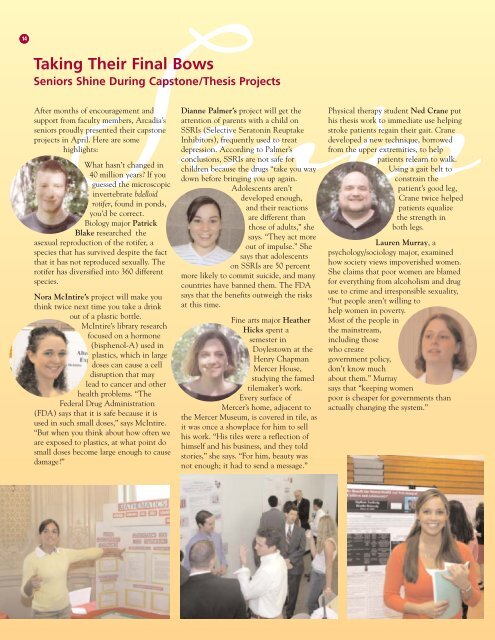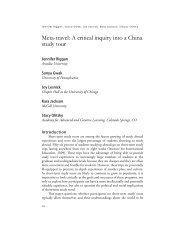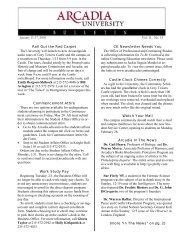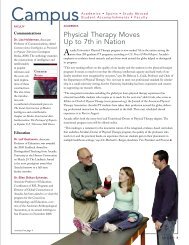Taking Their Final Bows
Taking Their Final Bows
Taking Their Final Bows
You also want an ePaper? Increase the reach of your titles
YUMPU automatically turns print PDFs into web optimized ePapers that Google loves.
14<br />
Senior<br />
What hasn’t changed in<br />
<strong>Taking</strong> <strong>Their</strong> <strong>Final</strong> <strong>Bows</strong><br />
Seniors Shine During Capstone/Thesis Projects<br />
After months of encouragement and<br />
support from faculty members, Arcadia’s<br />
seniors proudly presented their capstone<br />
projects in April. Here are some<br />
highlights:<br />
40 million years? If you<br />
guessed the microscopic<br />
invertebrate bdelloid<br />
rotifer, found in ponds,<br />
you’d be correct.<br />
Biology major Patrick<br />
Blake researched the<br />
asexual reproduction of the rotifer, a<br />
species that has survived despite the fact<br />
that it has not reproduced sexually. The<br />
rotifer has diversified into 360 different<br />
species.<br />
Nora McIntire’s project will make you<br />
think twice next time you take a drink<br />
out of a plastic bottle.<br />
McIntire’s library research<br />
focused on a hormone<br />
(bisphenol-A) used in<br />
plastics, which in large<br />
doses can cause a cell<br />
disruption that may<br />
lead to cancer and other<br />
health problems. “The<br />
Federal Drug Administration<br />
(FDA) says that it is safe because it is<br />
used in such small doses,” says McIntire.<br />
“But when you think about how often we<br />
are exposed to plastics, at what point do<br />
small doses become large enough to cause<br />
damage?”<br />
Dianne Palmer’s project will get the<br />
attention of parents with a child on<br />
SSRIs (Selective Seratonin Reuptake<br />
Inhibitors), frequently used to treat<br />
depression. According to Palmer’s<br />
conclusions, SSRIs are not safe for<br />
children because the drugs “take you way<br />
down before bringing you up again.<br />
Adolescents aren’t<br />
developed enough,<br />
and their reactions<br />
are different than<br />
those of adults,” she<br />
says. “They act more<br />
out of impulse.” She<br />
says that adolescents<br />
on SSRIs are 50 percent<br />
more likely to commit suicide, and many<br />
countries have banned them. The FDA<br />
says that the benefits outweigh the risks<br />
at this time.<br />
Fine arts major Heather<br />
Hicks spent a<br />
semester in<br />
Doylestown at the<br />
Henry Chapman<br />
Mercer House,<br />
studying the famed<br />
tilemaker’s work.<br />
Every surface of<br />
Mercer’s home, adjacent to<br />
the Mercer Museum, is covered in tile, as<br />
it was once a showplace for him to sell<br />
his work. “His tiles were a reflection of<br />
himself and his business, and they told<br />
stories,” she says. “For him, beauty was<br />
not enough; it had to send a message.”<br />
Physical therapy student Ned Crane put<br />
his thesis work to immediate use helping<br />
stroke patients regain their gait. Crane<br />
developed a new technique, borrowed<br />
from the upper extremities, to help<br />
patients relearn to walk.<br />
Using a gait belt to<br />
constrain the<br />
patient’s good leg,<br />
Crane twice helped<br />
patients equalize<br />
the strength in<br />
both legs.<br />
Lauren Murray, a<br />
psychology/sociology major, examined<br />
how society views impoverished women.<br />
She claims that poor women are blamed<br />
for everything from alcoholism and drug<br />
use to crime and irresponsible sexuality,<br />
“but people aren’t willing to<br />
help women in poverty.<br />
Most of the people in<br />
the mainstream,<br />
including those<br />
who create<br />
government policy,<br />
don’t know much<br />
about them.” Murray<br />
says that “keeping women<br />
poor is cheaper for governments than<br />
actually changing the system.”
Thesis<br />
Print communications major Beth<br />
Puliti looked at how<br />
females are represented<br />
in two Disney movies<br />
Snow White and<br />
Aladdin. She found<br />
that there wasn’t<br />
much change in the<br />
portrayal of the main<br />
female characters even<br />
though the films were made<br />
50 years apart. In both movies, her<br />
research found that the women still<br />
needed to be rescued by men and use<br />
their sexuality to get what they wanted.<br />
“Disney films look so innocent and<br />
magical,” Puliti says. “In reality, they are<br />
not examples of how to live your life.”<br />
Two students examined television<br />
commercials. Stefani Polkowski looked<br />
at stereotypical images of African<br />
Americans in commercials<br />
on two prime time<br />
shows, Girlfriends,<br />
aimed at African<br />
Americans (on<br />
UPN) and CSI,<br />
aimed at a more<br />
general audience (on<br />
CBS). “Very rarely did<br />
I see African Americans<br />
in an office situation, and if they were at<br />
home there was never a father,” she says.<br />
In addition, Polkowski says that the<br />
majority of African Americans featured<br />
were celebrities or athletes.<br />
Jessica Zbyszinski<br />
studied commercials<br />
aired during three<br />
popular series: CSI,<br />
Desperate Housewives and<br />
American Idol. Her research found a few<br />
disturbing things, especially a gender<br />
inequality favoring men. “In the<br />
commercials I surveyed, women are<br />
usually subordinate,” she says. “For<br />
example, in commercials that included<br />
the workplace, there was usually a male<br />
boss and a female secretary. At home, the<br />
women did the work and the men<br />
breezed in, ready for dinner.”<br />
Psychology major Amanda Lerch<br />
examined how adolescents and children<br />
deal with traumatic grief.<br />
She interned with the<br />
Family of Medical<br />
Victims in<br />
Philadelphia,<br />
helping to guide<br />
families through trials<br />
and beyond. She found<br />
that if child victims of<br />
traumatic grief are left untreated, they<br />
are more prone to severe adult problems<br />
such as drug abuse and suicide.<br />
Graduate student Tiffani Taylor (Public<br />
Health and Physician Assistant Studies)<br />
researched the lack of<br />
awareness about<br />
breast and cervical<br />
cancer among<br />
college students.<br />
Although many<br />
students don’t have<br />
much knowledge on<br />
the subjects, Taylor says<br />
that many want more information. While<br />
84 percent of the women surveyed said<br />
they do breast self exams, only 20 percent<br />
knew how often to do them and for how<br />
long. Also, only 50 percent go to a<br />
gynecologist, though many are<br />
sexually active. H<br />
15
















